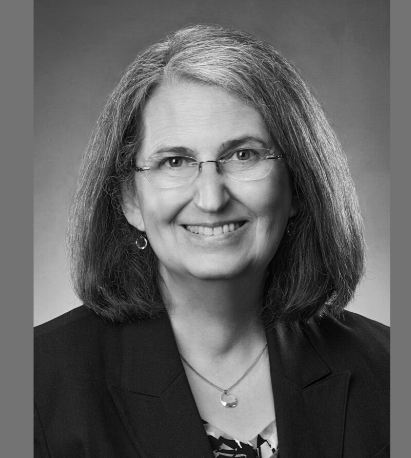As a librarian in the upstate New York village of Liverpool, she was frustrated with the way most libraries operated. “They were so slow to take risks!” she says.
Polly has told the news media on many occasions, “The enemy is complacency.” Polly was anything but complacent. The first class she had taken, back in 1974 in Syracuse University’s graduate Library School, was on ‘how to type a catalogue card, how many spaces to leave between items.’ “It was so boring!” she says. So, she signed up for some free, noncredit computing classes that were being offered in the Engineering Center.

“I learned BASIC and FORTRAN,” she says, “and other things that I knew were somehow going to be important for me, because I didn’t want to be stuck typing those damn cards!”
A year later, master’s degree in hand, Polly began working as a librarian in Liverpool. At conferences, she quickly saw that access to information via computers would be the wave of the future. When she learned that students, even grade-school kids, were getting Apple computers, she persuaded Liverpool Public to buy an Apple II Plus for public use.
It didn’t take long before people started coming in to play games like Oregon Trail or use the spreadsheet Visi-calc on the new device, as well as to use it as a word processor. The public was more amenable to technology than even Polly anticipated. Six months later, Liverpool Public needed a second computer – and a printer.
Then, in 1983, Polly launched a public electronic bulletin-board system (BBS) at the library, operating off a single, 1,200-baud modem. Now people could, from their home, use their own modem to call the library’s computer and log in to see what topics were available to talk about.
“Because we were librarians, we set up the topics according to the numbering of the Dewey Decimal System,” Polly laughs now. “But it was very innovative at the time. There was really no mainstream Internet yet, but our library had become like a baby AOL. We had only one phone line, so we turned that line over to the BBS each evening when we left. We called it ‘the night shift.’”
The night shift was very popular. By the following year, the library’s BBS was serving an amazing 1,000 callers per month from the regional area. (Liverpool’s population at the time was less than 2,000). “I answered a lot of reference questions online, and recommended books for people; it may have been the first online reference service anywhere,” Polly says.
Eventually, the BBS was supplanted by commercial sources of connection that Polly admits were a bit “spiffier” – such as AOL – but her love of technology was only growing. She began writing a monthly technology column for “Library Journal,” a canonical source of library-related information that libraries everywhere subscribed to. She started getting invitations to speak at various states’ library conferences and to give demonstrations of what computers could do. Her relatable style and enthusiasm must have worked, because librarians finally started getting excited.
“The idea that people could chat – for free – with folks on the other side of the world,” she recalls, “was pretty magical, back in the 1980s.”
Still, when the Internet began taking off in the early 1990s, many librarians were slow to embrace it. Some, who had enjoyed being the gatekeepers of all knowledge, were opposed to letting everyone now have access to unvetted information. Others told Polly they didn’t even know what the Internet was. Her standard reply was, “Look, if you never had a radio, you wouldn’t know what that was, either. You need to have a computer and an onramp and know how to drive onto it, that’s all.” And Polly was adamant that librarians should get involved so that they could help develop Internet policy as well as applications.
Polly’s short, clear, guide, “Surfing the Internet,” appeared in the popular library publication from H. W. Wilson Library Bulletin in June of 1992. Polly released it for free online later that year, and it tremendously boosted the growth of Internet access at libraries and led to her receiving queries from countries around the world. She was suddenly a sought-after speaker at library conferences, spending so many hours on planes, Polly says, that “I actually knew the flight crews by name. My office was in the air!”
That fall, she left Liverpool Public to join the nonprofit New York State Education and Research Network (NYSERNet), the New York State division of the National Science Foundation Network (NSFNet). With NYSERNet, she helped provide Internet access to universities, colleges, and research institutions, and new user communities at libraries, schools and Indian Nations. She also spurred national news media to give positive coverage to this emerging phenomenon, the Internet.
“I felt like I could do more as an Internet evangelist there, than in the library,” she says. “You always want a job with more bandwidth!”
Now retired, Jean Polly is grateful both that card-catalogue typing is no longer a requirement in library schools, and that Internet access is universally considered a core service of public libraries. Both of these improvements are due in part to the energy, persistence and talent of this 2019 Internet Hall of Fame inductee.